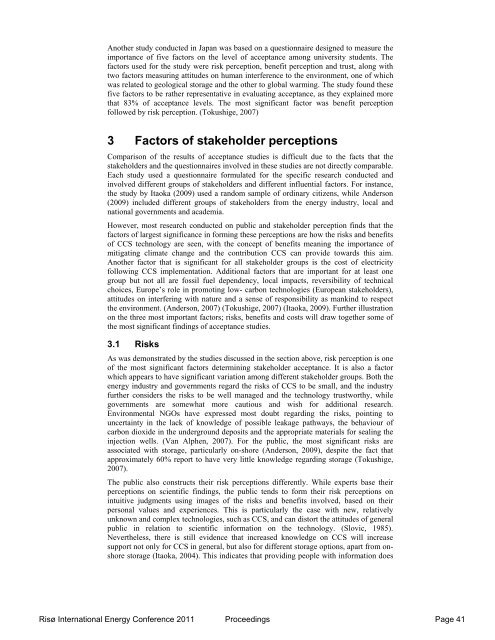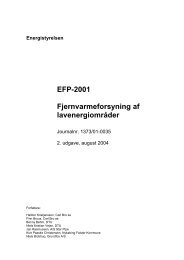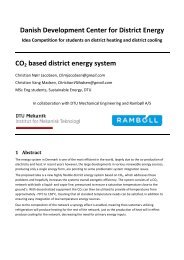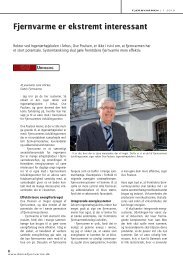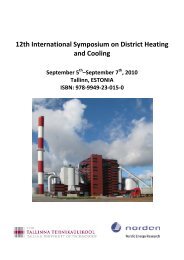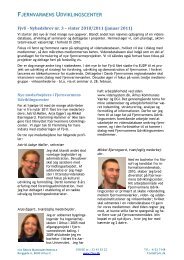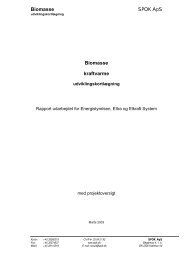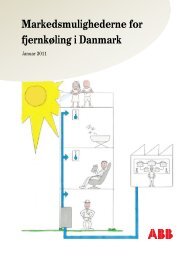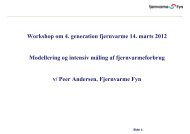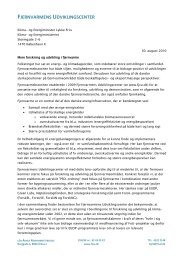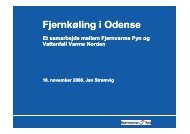Energy Systems and Technologies for the Coming Century ...
Energy Systems and Technologies for the Coming Century ...
Energy Systems and Technologies for the Coming Century ...
You also want an ePaper? Increase the reach of your titles
YUMPU automatically turns print PDFs into web optimized ePapers that Google loves.
Ano<strong>the</strong>r study conducted in Japan was based on a questionnaire designed to measure <strong>the</strong>importance of five factors on <strong>the</strong> level of acceptance among university students. Thefactors used <strong>for</strong> <strong>the</strong> study were risk perception, benefit perception <strong>and</strong> trust, along withtwo factors measuring attitudes on human interference to <strong>the</strong> environment, one of whichwas related to geological storage <strong>and</strong> <strong>the</strong> o<strong>the</strong>r to global warming. The study found <strong>the</strong>sefive factors to be ra<strong>the</strong>r representative in evaluating acceptance, as <strong>the</strong>y explained morethat 83% of acceptance levels. The most significant factor was benefit perceptionfollowed by risk perception. (Tokushige, 2007)3 Factors of stakeholder perceptionsComparison of <strong>the</strong> results of acceptance studies is difficult due to <strong>the</strong> facts that <strong>the</strong>stakeholders <strong>and</strong> <strong>the</strong> questionnaires involved in <strong>the</strong>se studies are not directly comparable.Each study used a questionnaire <strong>for</strong>mulated <strong>for</strong> <strong>the</strong> specific research conducted <strong>and</strong>involved different groups of stakeholders <strong>and</strong> different influential factors. For instance,<strong>the</strong> study by Itaoka (2009) used a r<strong>and</strong>om sample of ordinary citizens, while Anderson(2009) included different groups of stakeholders from <strong>the</strong> energy industry, local <strong>and</strong>national governments <strong>and</strong> academia.However, most research conducted on public <strong>and</strong> stakeholder perception finds that <strong>the</strong>factors of largest significance in <strong>for</strong>ming <strong>the</strong>se perceptions are how <strong>the</strong> risks <strong>and</strong> benefitsof CCS technology are seen, with <strong>the</strong> concept of benefits meaning <strong>the</strong> importance ofmitigating climate change <strong>and</strong> <strong>the</strong> contribution CCS can provide towards this aim.Ano<strong>the</strong>r factor that is significant <strong>for</strong> all stakeholder groups is <strong>the</strong> cost of electricityfollowing CCS implementation. Additional factors that are important <strong>for</strong> at least onegroup but not all are fossil fuel dependency, local impacts, reversibility of technicalchoices, Europe’s role in promoting low- carbon technologies (European stakeholders),attitudes on interfering with nature <strong>and</strong> a sense of responsibility as mankind to respect<strong>the</strong> environment. (Anderson, 2007) (Tokushige, 2007) (Itaoka, 2009). Fur<strong>the</strong>r illustrationon <strong>the</strong> three most important factors; risks, benefits <strong>and</strong> costs will draw toge<strong>the</strong>r some of<strong>the</strong> most significant findings of acceptance studies.3.1 RisksAs was demonstrated by <strong>the</strong> studies discussed in <strong>the</strong> section above, risk perception is oneof <strong>the</strong> most significant factors determining stakeholder acceptance. It is also a factorwhich appears to have significant variation among different stakeholder groups. Both <strong>the</strong>energy industry <strong>and</strong> governments regard <strong>the</strong> risks of CCS to be small, <strong>and</strong> <strong>the</strong> industryfur<strong>the</strong>r considers <strong>the</strong> risks to be well managed <strong>and</strong> <strong>the</strong> technology trustworthy, whilegovernments are somewhat more cautious <strong>and</strong> wish <strong>for</strong> additional research.Environmental NGOs have expressed most doubt regarding <strong>the</strong> risks, pointing touncertainty in <strong>the</strong> lack of knowledge of possible leakage pathways, <strong>the</strong> behaviour ofcarbon dioxide in <strong>the</strong> underground deposits <strong>and</strong> <strong>the</strong> appropriate materials <strong>for</strong> sealing <strong>the</strong>injection wells. (Van Alphen, 2007). For <strong>the</strong> public, <strong>the</strong> most significant risks areassociated with storage, particularly on-shore (Anderson, 2009), despite <strong>the</strong> fact thatapproximately 60% report to have very little knowledge regarding storage (Tokushige,2007).The public also constructs <strong>the</strong>ir risk perceptions differently. While experts base <strong>the</strong>irperceptions on scientific findings, <strong>the</strong> public tends to <strong>for</strong>m <strong>the</strong>ir risk perceptions onintuitive judgments using images of <strong>the</strong> risks <strong>and</strong> benefits involved, based on <strong>the</strong>irpersonal values <strong>and</strong> experiences. This is particularly <strong>the</strong> case with new, relativelyunknown <strong>and</strong> complex technologies, such as CCS, <strong>and</strong> can distort <strong>the</strong> attitudes of generalpublic in relation to scientific in<strong>for</strong>mation on <strong>the</strong> technology. (Slovic, 1985).Never<strong>the</strong>less, <strong>the</strong>re is still evidence that increased knowledge on CCS will increasesupport not only <strong>for</strong> CCS in general, but also <strong>for</strong> different storage options, apart from onshorestorage (Itaoka, 2004). This indicates that providing people with in<strong>for</strong>mation doesRisø International <strong>Energy</strong> Conference 2011 Proceedings Page 41


